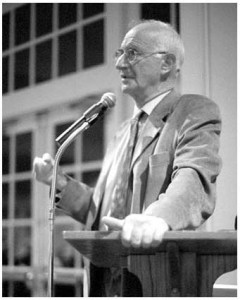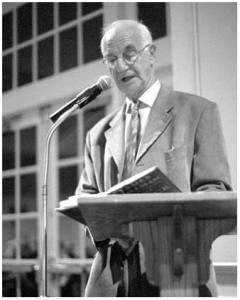Remembering James Hillman
 (NOTE: I have done some editing since first posting this.)
(NOTE: I have done some editing since first posting this.)
James Hillman, whose work I have long regarded as my principal intellectual inspiration, died Thursday, Oct. 27. The New York Times published his obituary with this opening paragraph:
James Hillman, a charismatic therapist and best-selling author whose theories about the psyche helped revive interest in the ideas of Carl Jung, animating the so-called men’s movement in the 1990s and stirring the pop-cultural air, died on Thursday at his home in Thompson, Conn. He was 85.
Thankfully, the obituary by a Times science writer doesn’t continue to depict Hillman in such a New-Agey way. Hillman called himself a “therapist of ideas” and I can see him recoiling and probably exploding on reading the opening graf of the Times obituary.
Hillman was cantankerous — something that made me nervous when I was around him. In fact, I wrote an essay, both admiring and critical, about him in 2002 that begins with an account of his eruption when he came to Atlanta on a book tour. You can read my essay here.
I first discovered Hillman and his “post-Jungian” Archetypal Psychology after taking a class in Jungian psychology during my MA program. I read his revolutionary book, Revisioning Psychology, which is a critique of the medicalized perspective that has come to dominate psychology.
The book is based on a series of lectures he gave at Yale in 1972 which, as I recall reading, outraged many because of its attempt to return to the conceptualization of psychology as soul-based. In the book, he writes about the multiplicity of the psyche, represented in the pantheon of the Greek gods. He advocates the abandonment of notions of cure. “The wound is the eye,” he would later say. Revisioning is one of 20-odd books Hillman wrote, along with countless journal essays.
Hillman at Pacifica
Because Hillman did his only teaching at Pacifica Graduate Institute outside Santa Barbara, where his papers were also stored, I decided to enroll in the doctoral program in depth psychology there. As I’ve recounted in many venues, I feel ambivalent about that decision now because, as it turned out, there was no real study of Hillman’s Archetypal Psychology offered. The one class supposedly about it turned out to be based on astrology (a fact that enraged me to a degree quite noticeable to my classmates and teacher).
Nonetheless, I did have freedom and encouragement to study Hillman’s work more deeply as part of my general coursework — something that I clearly would not have been allowed to do at other schools, where any Jungian thought is typically reviled. Further, Hillman’s thinking was central to my doctoral dissertation.
He did visit several classes I took and Pacifica hosted an annual weekend of lectures he gave. These opportunities allowed me to interact with him.
It was a huge disappointment to me to come to feel rejected by Hillman. It was not entirely my imagination. My classmates commented on it without prompting from me at one of his lectures.
I came up with two explanations. One, the more important, is that I was pretty challenging in my question at that lecture. Hillman was, of course, more than anything a severe critic of psychotherapy itself. He even co-authored (with Michael Ventura) a book entitled, We’ve Had a Hundred Years of Psychotherapy — and the World’s Getting Worse.
I asked him why, given his severe critique of psychotherapy, he didn’t advocate abandoning it altogether for a new approach to psychological change. (I should note that this lecture was attended mainly by psychotherapists.)
He balked and said, “I’m not ready to go that far.”
I replied, “Why not? We’ve put aside astrology for the most part, along with phrenology and magic.”
He looked at me, fell silent, and then said, “I’ll have to get back to you on that.”
After that, he would not call on me to ask a single question.
 I also felt that my being gay made him uncomfortable. I did see the men’s movement as considerably tinged by homophobia and sexism. This perception grew, especially during research on my dissertation. Hillman refused in any forum to discuss gender and sexuality (which made his involvement in the men’s movement strangely self-contradictory to me). I thought his dismissal of feminist and queer theory, given their importance in contemporary critical discourse, was a significant lacuna that Archetypal Psychology shared more generally with Jung’s thought.
I also felt that my being gay made him uncomfortable. I did see the men’s movement as considerably tinged by homophobia and sexism. This perception grew, especially during research on my dissertation. Hillman refused in any forum to discuss gender and sexuality (which made his involvement in the men’s movement strangely self-contradictory to me). I thought his dismissal of feminist and queer theory, given their importance in contemporary critical discourse, was a significant lacuna that Archetypal Psychology shared more generally with Jung’s thought.
My father complex
My dissertation was an attempted reconciliation of postmodern theory, especially queer theory, with Archetypal Psychology. (There remains among many the belief that postmodern discourses are altogether incompatible with Jung, Freud and Hillman.)
At one point early in my studies I was put in touch with one of Hillman’s former editors, then at HarperCollins, as I recall. He was interested in discussing my writing a biography of Hillman, even though, as I recall, he joked that it would be read by about six people. (This was before The Soul’s Code hit the best seller list.)
I was particularly interested in the period when Hillman created the Dallas Institute, where many thinkers in the field, like Thomas Moore, emerged. I was also interested in making clear how Henri Corbin’s studies of esoteric Islam heavily influenced Hillman’s thinking. Ditto for Rafael Lopez-Pedraza, whose famous dictum, “Stick to the Image,” was borrowed by Hillman. (The friction between Lopez-Pedraza and Hillman was described in Pat Berry’s lecture about Hillman during the infamous celebration of Hillman’s work at Notre Dame in 1992.)
I actually discussed the book proposal briefly with Hillman, before my experience at the lecture described above. He was encouraging and said he’d cooperate. I told him I questioned whether I should move in such a radical direction in my life. He told me that maybe I needed to.
Honestly, my decision not to pursue the project further had a lot to do with not wanting to deal with his temperament. I had access, by pure coincidence, to some of his little known personal history and I imagined he would be unhappy, to say the least, if I brought it up to him. I don’t really regret not pursuing the project and someone else does have a biography underway now.
At the same time, Hillman’s impatient intellect was, really, something I liked about him (as long as his outbursts were directed at other people and he didn’t go out of control!). I remember in one of my classes that he visited, one of the other students protested Hillman’s opposition to literalization of even central concepts like the “soul.” The student went on about knowing the soul was “a living thing” inside him. Hillman, exasperated, finally asked testily, “Exactly where in your body is the soul? Could you point it out to us?” My classmate fell into humiliated silence. (He soon dropped out of the program, I think because he found the curriculum less spiritual than he expected.)
My idealizations of Hillman resulted in a father complex that turned negative as I realized how adamant he was about not discussing gender and sexuality. I don’t mean that I recognized my father complex per se. I remember reading a paper in New Orleans at Enrique Pardo’s Myth and Theatre Festival, of which Hillman was a principal inspiration. After I read the paper, Pat Berry, author of the incomparable Echo’s Subtle Body, pulled me aside and told me I needed to get over my father complex. I was offended but by the time the conference was over, I was giving her comment some thought. Soon, I was reading Lacan and Freud.
A few years later, I mentioned to Chris Downing, my dissertation advisor, that I thought my dissertation might have become part of working through my father complex. Her response amounted to “Duh! No kidding.”
In actuality, I did work through my complex, as the essay linked above indicates, I think. I never did let go of my goal to put his ideas — particularly the role of the imagination — into use as psychological praxis. (You can read an interview about that here.) I continue to think of my work as outside psychotherapy and inspired by Hillman.
My disappointment in Hillman blocked me in all kinds of ways. But the agonizing process of writing my dissertation did indeed bring me back to a place of huge appreciation for Hillman’s work while acknowledging that, like the work of Jung that inspired him, Archetypal Psychology needs to go farther. (It was no coincidence, I think, to discover in my research that Jung and Freud wrote about their shared homosexual feelings and father complex.)
I could write much more, but I’ve said enough for now. My condolences to Hillman’s family and his many followers.
(Photos courtesy of the Atlanta Jung Society)
There are 1 Comments to "Remembering James Hillman"
Thank you, Cliff for your remembrance. I attended the presentation at the Jung Society in Atlanta. I guess the photographer has from then on asked for permission to take a pic. One way I can honor his Psyche is to ask you for direction regarding the tension between post modern thought and archetypal constructs. What sort of horizon can archetypal thought occupy when essentialist structures are seen as untenable by many thinkers today? Thank you for your work.